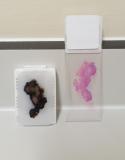Test Directory
EWSR1 gene rearrangement
Containers - Adult

FFPE block / H&E slide / Pathology report
|
|
Laboratory Site
Old Dalkeith Road
Edinburgh
EH16 4SA
Transport arrangements
Referral specimens should be sent directly to Molecular Pathology at the above address (see transport recommendations). For patients with pathology specimens held within NHS Lothian there is no need to arrange transport of specimens.
How to request
Testing for NHS Lothian patients can be requested by email to molecular.pathology@nhslothian.scot.nhs.uk or by discussion with an NHS Lothian Pathologist. Referral requests may be accompanied by a completed request form or covering letter.
Please also refer to our detailed requesting instructions.
Availability
Monday - Friday. 09:00 – 17:00
Anticipated turnaround
Turnaround times will vary depending on the nature of the report required.
Individual FISH results should be available within 10 working days. See results.
Static information/disclaimer
This test is accredited to ISO 15189.
Please note, alternative methodologies may be used. Full details will be included in all reports.
General additional information
Ewing’s sarcoma is classically associated with a t(11;22)(q24;q12) rearrangement of the EWSR1 gene, resulting in an altered transcription factor through EWSR1-FLI1 fusion, although numerous other translocations in Ewing’s and Ewing’s-like small-blue-round-cell tumours have been described. These include EWSR1-ATF1 in clear cell sarcoma, EWSR1-WT1 in desmoplastic small round cell tumour, EWSR1-CREB1 in primary pulmonary myxoid sarcoma and EWSR1-CHN in myxoid chondrosarcomas.
A positive EWSR1 gene rearrangement result is considered to be supportive evidence where a pathological diagnosis of Ewing’s sarcoma or other Ewing’s-like tumour is being considered.
EWSR1 gene rearrangements are detected by break-apart fluorescence in-situ hybridisation (FISH) analysis. The method will identify a chromosomal rearrangement involving the EWSR1 locus at 22q12, but not the specific gene fusion partner.
For clinical advice on appropriate investigations, please contact our Molecular Pathology team